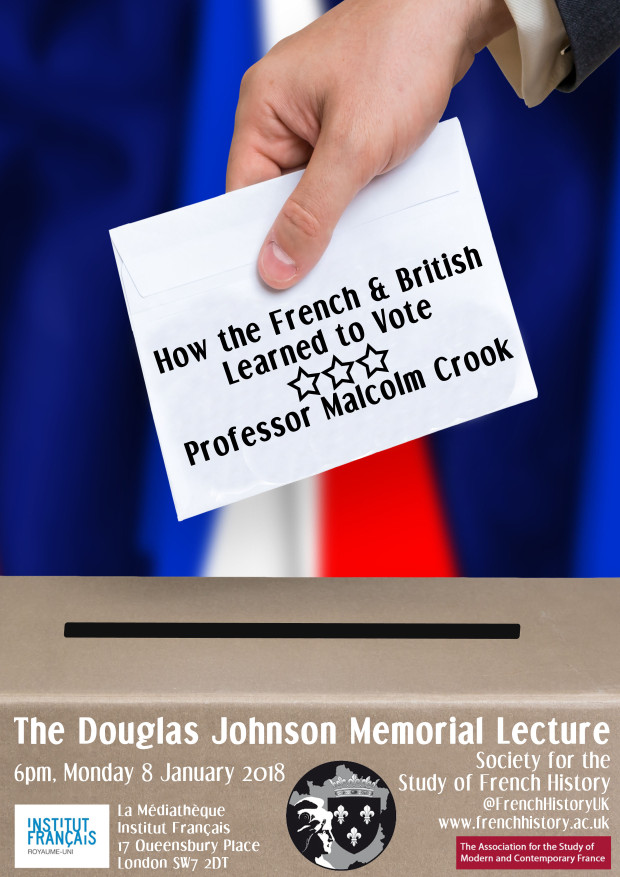Eighth Douglas Johnson Memorial Lecture in French History

The Society for the Study of French History
and
The Association for the Study of Modern and Contemporary France
and
Institut Français, Royaume-Uni
Present:
The Douglas Johnson Memorial Lecture,
Monday 8th January 2018.
How the French and British Learned to Vote
Professor Malcolm Crook (Keele University)
Venue:
La Médiathèque, Institut Français, 17 Queensberry Place, South Kensington, London SW7 2DT
Tickets:
 Professor Malcolm Crook’s lecture will draw on original research into the history of voting in France, whose specific features are further illuminated by a comparison with that of Britain. The lecture will explore the relatively neglected subject of how people cast their votes rather than who was elected, by focusing on three important questions. First, turnout: just how many of those progressively enfranchised from the late eighteenth century onwards responded positively to the opportunity to make their choice of representatives at different levels of the electoral process, and why has non-voting recently become more pronounced? Second, secrecy: taken for granted today, why was the vote cast in public, even orally, for much of the nineteenth century when the vote was cast in public, and why was this openness stoutly defended in some quarters until the later advent of ballot papers, polling booths, envelopes and isoloirs? Thirdly, and finally, spoiling: in the second round of the presidential contest in France last June, why did no less than four million people submit a blank or annotated paper, knowing it would not count? This subversive practice, which seems to be catching on in Britain, has a long history on the far side of the Channel. In conclusion, like other aspects of voting culture, does it testify to an enduring vitality in the way the French people express their sovereignty?
Professor Malcolm Crook’s lecture will draw on original research into the history of voting in France, whose specific features are further illuminated by a comparison with that of Britain. The lecture will explore the relatively neglected subject of how people cast their votes rather than who was elected, by focusing on three important questions. First, turnout: just how many of those progressively enfranchised from the late eighteenth century onwards responded positively to the opportunity to make their choice of representatives at different levels of the electoral process, and why has non-voting recently become more pronounced? Second, secrecy: taken for granted today, why was the vote cast in public, even orally, for much of the nineteenth century when the vote was cast in public, and why was this openness stoutly defended in some quarters until the later advent of ballot papers, polling booths, envelopes and isoloirs? Thirdly, and finally, spoiling: in the second round of the presidential contest in France last June, why did no less than four million people submit a blank or annotated paper, knowing it would not count? This subversive practice, which seems to be catching on in Britain, has a long history on the far side of the Channel. In conclusion, like other aspects of voting culture, does it testify to an enduring vitality in the way the French people express their sovereignty?
